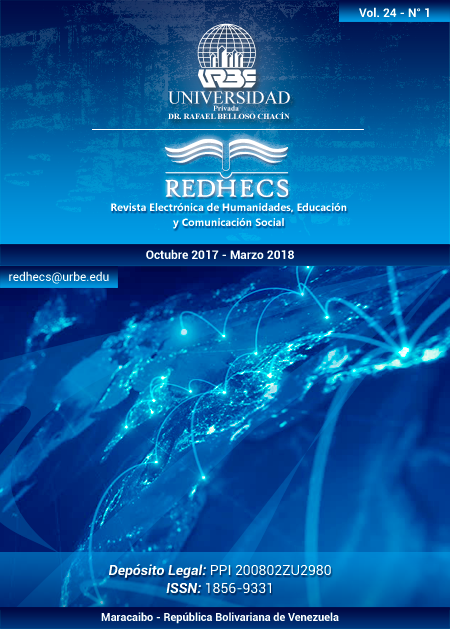FACTORES QUE DETERMINAN LA EFECTIVIDAD DE LAS TIC EN LA MEDIACIÓN TECNOLÓGICA DEL APRENDIZAJE
Resumen
El presente artículo tiene como propósito analizar los factores que determinan la efectividad de las TIC en la mediación tecnológica del aprendizaje. El mismo está sustentado en las ideas de Moscardini (2015), MEN (2013); Yanes (2011), Tobón (2010); MEN (2012), Tedesco (2008), Martín (2008); Burbles (2008), Morrissey (2008), Heep (2008), Brunner (2008), Duro (2008), entre otros. Se desarrolló siguiendo la metodología del análisis documental. En esa lógica, se analizaron documentos científicos tales como textos, artículos arbitrados y memorias de congresos internacionales para identificar experiencias derivadas de la aplicación de las TIC en diversos contextos educativos del mundo, extrayendo de ellas algunos factores comunes que determinan su efectividad en el ámbito educativo. Finalmente, partiendo de las coincidencias observadas se analizaron diversos factores de orden social, económico-tecnológico y cultural. Luego del análisis, se concluyó que la simple dotación de recursos tecnológicos en las instituciones educativas no garantiza la efectividad de las TIC en la mediación de los aprendizajes. En este sentido, se considera fundamental la formulación de un plan estratégico que tome en cuenta los factores antes mencionados a los fines de lograr una mediación tecnológica efectiva.
Descargas
Citas
Brunner, J. (2008). A society mobilized towards ICT. Presentation of the International Seminar How ICT transforms the school. Argentina. Unicef.
Burbules, N. (2008). Risks and promises of ICT in education. What have we learned in the last ten years? Presentation of the International Seminar How ICT transforms the school. Argentina. Unicef.
Duro, E. (2008). ICT and Educational Justice. Presentation of the International Seminar How ICT transforms the school. Argentina. Unicef.
Lugo T. and Kelly V. (2008). The management of ICT in schools: the challenge of managing innovation. International Seminar presentation, How ICTs transforms the school. Argentina. Unicef.
Martín, E. (2008). The impact of ICT on learning. International Seminar presentation, How ICTs transforms the school. Argentina. Unicef.
Ministry of National Education of Colombia. MEN (2012). Educator education policies. Colombia. Learn Spanish.
Ministry of National Education of Colombia. MEN (2013). ICT skills for professional teacher development. Colombia. Learn Spanish.
Morrissey, J. (2008). The use of ICT in teaching and learning. Issues and challenges. International Seminar presentation, How ICTs transforms the school. Argentina. UNICEF.
Moscardini, G. (2013). Development of multiple intelligences through information and communication technologies in the students of the National Experimental University Francisco De Miranda (UNEFM) in Coro, Falcón State. PhD thesis. Rafael Belloso Chacín University (URBE). Maracaibo, Zulia, Venezuela.
Tedesco, J. (2008). ICT in the agenda of educational policy. International Seminar presentation, How ICTs transforms the school. Argentina. Unicef.
Tobón, S. (2010). Integral Training and Competencies. Colombia. Ecoeditions.
UNESCO (2013). Strategic approaches to ICTs in education. Chile. Library and Information Management Series.
Yanes, J. (2011). ICT and the crisis of education. España. Virtual digital library


